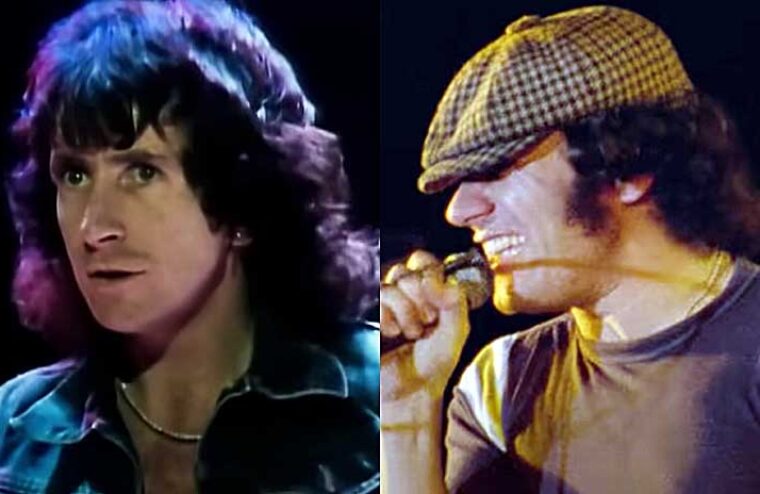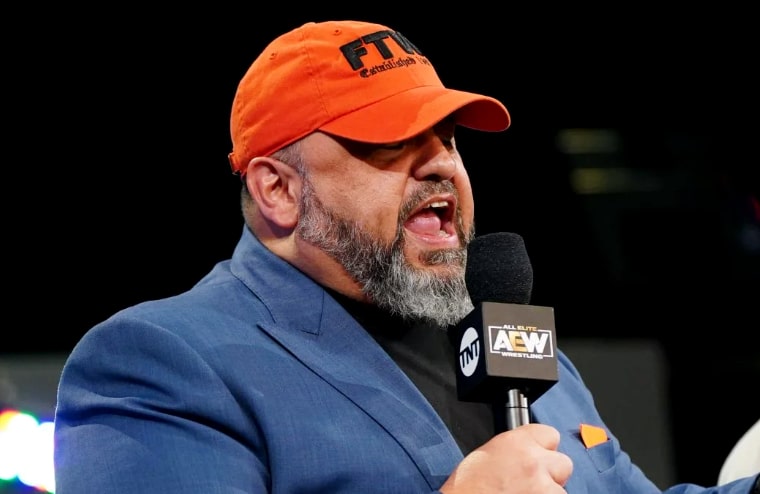Author Jesse Fink has penned the two most exhaustively researched AC/DC books ever written. His 2013 tome, “The Youngs: The Brothers Who Built AC/DC,” is an in-depth look at many of the key figures behind’s the band’s success and often a cut-throat portrayal of how Angus and Malcolm’s business dealings helped the group to monumental heights.
His 2017 biography of late lead singer Bon Scott, “Bon: The Last Highway,” chronicles the legendary frontman’s final three years and addresses the two most controversial topics in AC/DC history: “How did Bon Scott really die?” and “Did Bon Scott contribute to ‘Back in Black?’”
The latter of those questions has again become a heated debate among AC/DC fans, and it has also been addressed by AC/DC singer Brian Johnson as he makes the rounds promoting his new autobiography, “The Lives of Brian.”
Famously, Johnson was hired as Scott’s successor, and the resulting album, “Back in Black,” went on to become the second-biggest selling album in music history. The liner notes read: “All songs written by Young, Young and Johnson,” but many have questioned whether or not any of Scott’s lyrics were used posthumously.
Fink’s evidence of Bon on “Back In Black”
I previously summed up some of Fink’s evidence for a Web Is Jericho feature on “Bon: The Last Highway,” but here’s a quick rundown.
Fink talked to a a part-time girlfriend and confidante of Scott, Holly X, who told him that her pet horse was called “Doubletime.” She also had chartreuse eyes which Holly said was the original lyric. “She had the sightless eyes … working double time on the seduction line,” Johnson sang.
Another girlfriend, Silver Smith, maintains that she saw lines from the song in one of Scott’s letters in 1976, and that on the night of his death, Scott had just finished writing the lyrics to the “Back in Black” album.
Fink also raises questions concerning other “Back in Black” lyrical content, notably on the title track, “Hell’s Bells,” “Rock and Roll Ain’t Noise Pollution,” “Have A Drink On Me” and “Shoot To Thrill,” but those are more a case of the author connecting dots back to Scott’s lyrical style. He writes in “Bon: The Last Highway”: “Some of the songs on ‘Back in Black’ sound so much like Bon had written or part-written them that the conspiracy theory — that Bon did in fact contribute lyrics to the album only to go completely uncredited — actually isn’t far-fetched at all.”
Fink also illustrates that prior to joining AC/DC, Johnson had shared songwriting credits on only a handful of tracks with his prior band, Geordie. Johnson said the first song he wrote for AC/DC was “You Shook Me All Night Long,”
“Vic Malcolm was the principal songwriter in Geordie,” Fink wrote. “But holed up in a cabin by a beach on the island of New Providence in the Bahamas in April 1980, under pressure to write something, Brian conjured up the greatest melody of AC/DC’s entire career, straight off the bat.”
Brian Johnson responds
Johnson recently responded to the songwriting rumors in an interview with Metal Edge, where he appears to be referencing both Fink and Scott’s former bandmate in The Valentines, Vince Lovegrove.
Lovegrove maintained years before his passing in 2012 that the Scott family receives royalties for “Back in Black” suggesting that the late, legendary frontman contributed to the album in some way.
“… There’s this guy in Australia, who was absolutely positive that Bon had written the lyrics,” Johnson said. “And he wouldn’t shut up and he wouldn’t go away and he was even to the point of phoning Derek, Bon’s brother, and he’s a lovely guy and all that and he was sick of this guy as well.”
“I won’t say his name, ‘cause it’s not worth mentioning it,” Johnson continued. “He was saying that Bon had written the words and that I had claimed them. Now, in the real world, that just doesn’t happen. First of all, the boys in the band would’ve given me them to sing, and they would’ve put his name on there – it’s simple as that, it’s a simple thing. And it was proved, beyond any shadow of a doubt, you know, but this guy just kept pestering people.”
Johnson continued: “There’s too many people who were there, you know, that saw what happened and I just felt…I just felt I had to say somethin’. I wasn’t going to because I’m not gonna let this guy think it’s bothering me. But the truth was, it did bother me in a way. ‘Why would he do that?’ Then, of course, he’s one of these conspiracy theorists – you know what I mean – they’re always there. I just said, let me put a full stop on this. I’ll just put a full stop on this and just say, ‘That’s enough.’”
Who wrote what?
I certainly understand Fink raising questions about the topic. He cites two interviews that Angus Young gave previously including one with Paul Elliott of Kerrang in 1991 where the guitarist said “Bon wrote a little of the stuff,” when pressed on who wrote lyrics for “Back In Black.”
Angus also told Elissa Blake of Rolling Stone Australia: “The only time (we thought about quitting) was when Bon died. We were in doubt about what to do but we had songs that he had written and wanted to finish the songs. We thought it would be our tribute to Bon and that album became ‘Back in Black.’”
So did Bon write for the record?
My view: Kind of.
To me, I think that Bon’s influence is certainly present, and a lot of that had to do with the fact that AC/DC as a unit were on an absolute career writing peak. From “Let There Be Rock” to “Powerage” to “Highway To Hell” to “Back In Black,” there isn’t a four-album stretch by any other band of any genre in history to match that level of brilliance. And yes, certain lines and song titles likely came from the late singer, most notably phrases in “You Shook Me All Night Long” which Fink provided the most telling evidence for.
As for the rest? Sure, you can certainly close your eyes and imagine Bon signing a lot of this. Part of that is down to fact that Bon and Brian often sing in a similar register. But this also was still a band writing music in the mode they were accustomed to — for Bon Scott. That wasn’t going to immediately change with the arrival of a new singer.
Johnson says he wrote the bulk of the lyrics for “Back in Black” based off of titles given to him by Angus and Malcolm Young. It’s my belief he also had help from producer Mutt Lange and the Young brothers as he crafted those lyrics, but that’s nothing Lange and the Youngs wouldn’t have also done with Bon Scott on “Highway to Hell.” Still, Johnson does deserve the credit for most of the lyrics on “Back in Black.”
No one seems to mention “Shake A Leg,” “Given The Dog A Bone,” “Let Me Put My Love Into You” or “What Do You Do For Money Honey” as part of any of the “Bon wrote it all” arguments. Lyrically, those tunes, along with most of what is sung on “Shoot To Thrill,” “Rock and Roll Ain’t Noise Pollution,” “Have A Drink On Me” and the title track have more in common with AC/DC lyrics post-“Back in Black” than prior.
Also lost in these arguments is the genius of producer Mutt Lange. Keep in mind, this is the guy who has crafted numerous hit melodies over the course of his career for a variety of artists. Lange, for most of his work, represents the very definition of a great producer. The band brings the songs. The producer steers the ship to get the most out of what is there and at times make suggestions to the song arrangements and melodies themselves.
Lange was gone after AC/DC’s “For Those About To Rock” album, which in part is another reason the band’s modern-day output is viewed more harshly. That’s down to the fact that AC/DC post-Lange has sometimes sounded a lot more harsh.
Who made who? And who deserves credit?
Should Bon be credited on “Back in Black? Yes. Even if they only used “a little” of his stuff as Angus previously said. But if it hasn’t happened to this point, an “All songs written by Young, Young, Johnson and Scott,” revision isn’t coming.
What confounds the situation is AC/DC’s steadfast refusal to again admit that they used “a little” of what Bon had written. That could very well be down to the band opening itself up for a publishing lawsuit, but it makes the situation murky.
What also makes things murky is I believe Johnson believes that Scott had no involvement — in terms of song titles or even brief lines. As far as he knows, any lyrics he didn’t put to paper came from Angus, Malcolm or Lange. If we learned anything from Fink’s “The Youngs,” it’s that AC/DC doesn’t operate like a group of pals who get together for fun to have a few beers and bash out some tunes. It’s a business — big business. Johnson revealed in “The Lives of Brian” that when the call came to record the band’s latest record, “Power Up,” it came from management, not from Angus himself.
Johnson is the No. 1 employee of Angus Young and the AC/DC empire, and he has had to toe the company line for more than 40 years. As early as last week, Johnson bristled when he was asked by SiriusXM’s Eddie Trunk about touring plans saying the interview was entering tabloid territory. That was simply to the question of “Any plans to tour or record?”
AC/DC are fiercely protective of their brand and legacy, and Johnson is not the “tell-all” sort of person to go against that, even if he was aware of Scott’s lyrics or song titles being used.
But let’s give the guy a little credit here. Brian Johnson has manned the AC/DC ship admirably for more than four decades and has fronted a worthy share of some of the band’s most memorable and successful songs. If AC/DC didn’t become the juggernaut it is today, this is a discussion I’m not sure any of us would be having. Whether he wrote every word on “Back in Black” or not, Johnson has been a key part in helping AC/DC become the world’s biggest rock band.
- Slipknot’s New Drummer Speaks - May 1, 2024
- Major Update In Linkin Park Plans For 2025 - May 1, 2024
- Vince Neil Talks About Mötley Crüe Record He Hates - April 30, 2024




